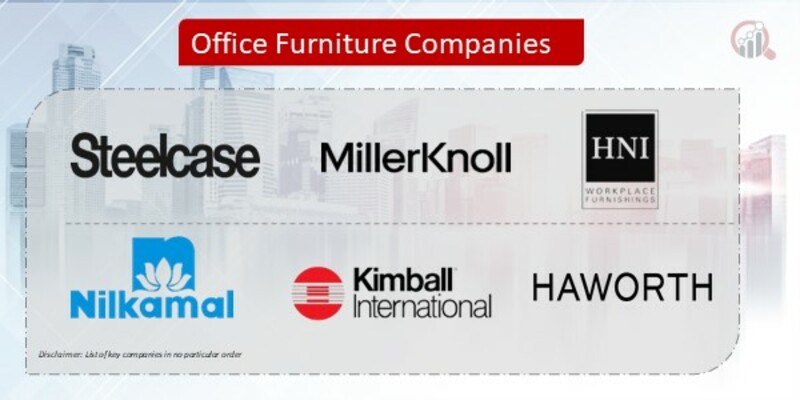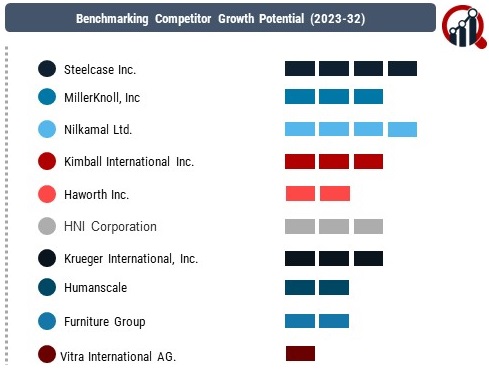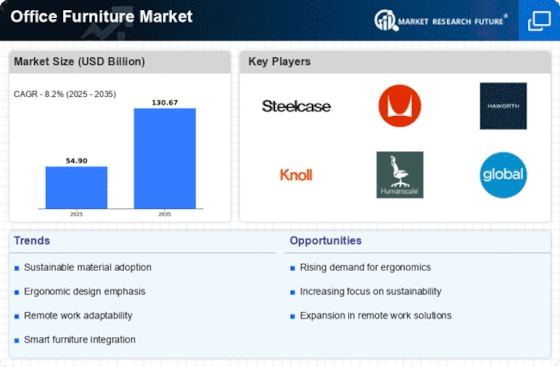Top Industry Leaders in the Office Furniture Market

As the office furniture market evolves, new and emerging companies are entering the arena, bringing fresh perspectives and innovative designs. Start-ups like Branch and Fully have gained traction by focusing on direct-to-consumer models, offering affordable yet stylish and functional office furniture. These companies often leverage digital platforms and customer-centric approaches to disrupt traditional distribution channels. The industry is witnessing a shift towards flexible and remote work solutions, prompting new entrants to provide modular and adaptable furniture options that align with the changing nature of contemporary work environments.
Industry news within the office furniture market reflects ongoing trends, technological advancements, and shifts in workplace dynamics. News related to collaborations with interior designers, architects, and workspace consultants showcases efforts to stay ahead of design trends and meet diverse client needs. Moreover, developments in smart furniture, incorporating technology for enhanced connectivity and functionality, are frequently covered in industry news, reflecting the increasing integration of digital solutions in modern offices. The market also responds to global events and societal changes, with news covering topics such as the impact of the COVID-19 pandemic on remote work trends and the growing importance of wellness-focused office designs.
Current investment trends in the office furniture industry underscore a dual focus on sustainability and technology integration. Key players are directing investments towards research and development to create furniture using eco-friendly materials, exploring circular economy principles, and adhering to green certifications. Investments in digital tools for virtual planning and design, as well as technologies like IoT for smart office solutions, are prevalent, reflecting a commitment to addressing the evolving needs of the modern workplace. Additionally, strategic investments in customer experience initiatives and online sales channels are notable trends as companies seek to enhance their presence in an increasingly digital business environment.
The overall competitive scenario in the office furniture market is characterized by a blend of established brands and innovative newcomers, each navigating the industry with distinct strategies. Market share analysis considers factors such as brand reputation, design innovation, and responsiveness to evolving workplace trends. The industry's responsiveness to sustainability, remote work trends, and the integration of technology further shapes competitiveness. As businesses continue to reevaluate office spaces and adopt hybrid work models, the office furniture market is poised for continued evolution, with companies seeking to strike a balance between functionality, aesthetics, and sustainable practices.
In conclusion, the office furniture market's competitiveness is driven by a mix of established players and innovative newcomers. Key players strategically position themselves through brand reputation, design innovation, and sustainability efforts. New entrants leverage direct-to-consumer models, affordability, and adaptability to modern work trends to establish their presence. Industry news reflects the dynamic nature of the market, responding to design trends, technological advancements, and shifts in workplace dynamics. Current investment trends emphasize sustainability, technology integration, and a customer-centric approach. The overall competitive scenario underscores the importance of adaptability, innovation, and a nuanced understanding of the multifaceted factors influencing the office furniture market.
Industry News and Investment Landscape:
- Acquisitions in the recent past, such as Steelcase's acquisition of Orangebox, point to market consolidation patterns.
- A future-focused approach is indicated by increased investments in research and development with an emphasis on sustainability, ergonomics, and technology integration.
- The increasing focus on the welfare of employees and the emergence of hybrid work patterns pose a range of opportunities and difficulties for the furniture manufacturing industry.
Key Companies in the Office Furniture Market Include –
- Steelcase Inc.
- MillerKnoll, Inc
- Nilkamal Ltd.
- Kimball International Inc.
- Haworth Inc.
- HNI Corporation
- Krueger International, Inc.
- Humanscale
- Furniture Group
- Vitra International AG.











